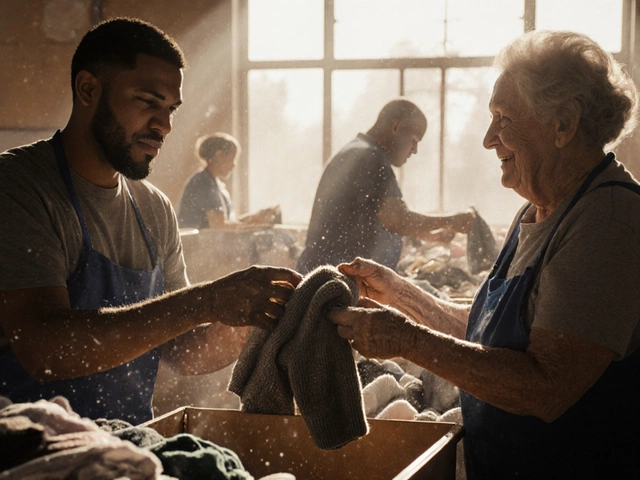Volunteering isn’t just about giving. It gives back in ways you probably wouldn’t expect. Maybe you already know someone who landed a dream job because of their time helping at a local shelter. Or maybe you’ve seen a friend pick up new skills cooking for a nonprofit. People always talk about “doing good,” but what about the good it does for you?
If you ever thought your spare time was just for binge-watching shows, you’re missing out. Volunteering lets you learn quick problem-solving, build connections, and gain experience you can actually use. It’s like getting hands-on training, without the boring classroom part. Plus, whether you’re shy or outgoing, you’ll meet people from all walks of life. It’s an instant confidence booster and a killer way to expand your world—fast.
- Skill Building and Real-World Experience
- Networking and Meeting People
- Impact on Career Opportunities
- Boosting Mental Health and Well-being
- Personal Growth and Confidence
- Unexpected Perks and Daily Benefits
Skill Building and Real-World Experience
Volunteering is hands-down one of the fastest ways to pick up real-world skills that you can actually use, both in your personal life and your career. Forget just answering phones or stuffing envelopes—volunteers often do all sorts of things: planning events, managing social media, tutoring kids, fixing computers, organizing food drives. Big companies like Deloitte have found that 82% of hiring managers prefer hiring people with volunteer experience because it shows they can handle responsibility and work in a team.
If you want to beef up your resume fast, volunteering is like a secret weapon. Even just a few hours a week exposes you to team projects and unique challenges you’d never face at a regular job right away. You learn to juggle responsibilities, manage deadlines, deal with different personalities, and solve problems on the fly.
You also get to test out new roles you might never think to try. Ever wanted to see how fundraising works or what goes into event planning? Volunteering is a no-pressure space to give it a go. It’s okay to mess up—that’s part of the learning.
- Project management — running events, handling logistics
- Public speaking — leading tours or workshops
- Social media — posting updates, engaging audiences online
- Bilingual skills — translating for diverse communities
- Problem-solving — finding creative solutions on tight budgets
Here’s a quick look at just how much skill growth happens, based on recent survey stats:
| Skill Gained | Pct. of Volunteers Who Reported Growth |
|---|---|
| Leadership | 48% |
| Communication | 62% |
| Organization | 54% |
| Technology | 28% |
The best part? Volunteering doesn't require you to already be an expert. You’ll keep learning on the job, and most organizations are more than happy to teach as you go. If you want to show volunteer benefits on your resume, don’t just list your hours. Highlight the specific projects you worked on and the real-world experience you gained—that’s what stands out to future employers.
Networking and Meeting People
When you volunteer, you don’t just work—you connect. Think about it: volunteer gigs usually put you on a team, whether you’re helping out at a food bank, a charity run, or a dog rescue. There’s no better icebreaker than working side by side for a shared purpose. Research from VolunteerMatch found that over 60% of volunteers say making new friends is one of the biggest takeaways from their experience.
It’s not just about finding buddies. A lot of nonprofit teams are made up of people from different backgrounds and careers. You’ll cross paths with professionals, students, retirees, and sometimes even business owners. This brings incredible opportunities to build your network in totally unexpected ways. If you’re job hunting or trying to figure out your next step, the right contact from a volunteer job can open huge doors. LinkedIn data from 2024 shows that users who list volunteer experience get up to 27% more messages from recruiters than those who don’t.
| Networking Benefit | How It Helps |
|---|---|
| Meet new friends | Build community and trust faster than at typical social events |
| More professional contacts | Chance to get references or leads for jobs and internships |
| Explore different industries | Exposure to people in roles you might never find otherwise |
| Social events and mixers | Volunteer groups often host get-togethers or reunions |
Here’s a tip for making the most of those connections:
- When you start volunteering, introduce yourself to the team right away. Ask questions—most people love sharing what they do and why they’re involved.
- Add coworkers or supervisors from your volunteer gig to your LinkedIn profile. Mention your experience in your profile summary to boost your volunteer benefits.
- Keep in touch after the project ends; you never know which connection could lead to your next opportunity.
Basically, volunteering gives you a friendly, low-pressure way to meet new people—and sometimes, that’s where the best opportunities pop up.
Impact on Career Opportunities
Ever wondered why volunteering shows up on so many resumes? It's not just for filling space. There's real proof that volunteer work boosts your job prospects. One study from LinkedIn found that 41% of employers consider volunteer experience just as valuable as paid work. That’s kind of huge. And get this—20% said they’d made a hiring decision based on volunteer experience.
You don’t need a fancy role or charity job to make your volunteer gig matter. Real-world tasks like organizing events, fundraising, or running social media can give you hands-on proof of your skills. Recruiters love seeing quick learners and folks who step up, and volunteering is a perfect way to show that off.
Here’s how giving your time helps your career:
- Volunteer benefits include learning teamwork, time management, and leadership—the same things employers are always chasing.
- You gain references who actually saw you do the job, not just your old school teachers.
- You might uncover a passion that sends you down a new career path you hadn't considered.
- Many nonprofits need everything from digital skills to logistics, so you get to try out roles you won't find in typical entry-level jobs.
Check out some stats about how volunteering can open career doors:
| Fact | Detail |
|---|---|
| Percent of employers who value volunteer work | 41% (LinkedIn, 2020) |
| Hiring decisions influenced by volunteering | 20% (LinkedIn, 2020) |
| Skills developed while volunteering | Leadership, Teamwork, Communication, Problem-solving |
The best part? You end up building your confidence outside your comfort zone, all while showing future employers you’re ready to hustle and learn. And if you play it smart, your next volunteer gig could double as your next big professional break.

Boosting Mental Health and Well-being
It’s wild how something as simple as volunteering can totally change your mood. There's no need to just take my word for it—check out what real research says. According to a study published in BMC Public Health in 2020, people who volunteer regularly are less likely to struggle with depression and report feeling more satisfied with their lives. Even just two hours a week can make a difference, especially for adults facing stress at work or school.
It’s not magic. Volunteering gives you a reason to get out of bed, connects you with others, and keeps you busy in a way that actually feels rewarding. When you spend time helping someone else, your brain releases more feel-good chemicals like dopamine and oxytocin. Don't be surprised if you leave a shift feeling more upbeat than when you started.
Here’s a quick look at some key stats about volunteer benefits for mental health:
| Fact | What It Means |
|---|---|
| 88% of volunteers say it lowers their stress | Less daily stress, more relaxed mindset |
| 76% feel healthier overall | Big mental boost, but also reports of more energy |
| Over half say volunteering helps with depression | Many use it to manage tough feelings |
| People who volunteer have a 22% lower risk of dying over four years, compared to non-volunteers (Carnegie Mellon, 2013) | That’s not a typo—helping others actively helps you live longer |
Pain isn’t always physical. If you’re feeling down or anxious, regular volunteer work helps you reboot your routine and gives you a sense of purpose. Plus, you’re not doing it alone. You’ll likely find yourself working as part of a team, which naturally fights off loneliness and isolation. Some volunteers even describe it as "therapy without the bill."
If you want to start feeling these mental health perks, pick something close by or a cause you care about. The key is to keep showing up. Consistency brings the biggest rewards for your head and your heart.
Personal Growth and Confidence
One of the biggest surprises about volunteering? How much it can change how you see yourself. A big 2021 Harvard Health study found that people who volunteer feel 27% more confident in their daily lives. The reason is simple: every time you solve a new problem or help someone out, you prove to yourself that you’ve got what it takes.
Confidence doesn’t come from sitting on the sidelines. When you volunteer—whether you’re coaching a kids' soccer team, organizing a fundraiser, or helping out at a soup kitchen—you’re put right in the mix. You make real decisions, face unexpected challenges, and sometimes need to figure things out on the spot. All of these moments add up. They teach you you’re more capable than you thought.
Personal growth isn’t just about feeling good, though. Volunteers often pick up important life habits, like staying organized, managing time better, and taking initiative. These skills stick with you and can make everything from job interviews to everyday tasks easier.
Here’s what helps most people grow from volunteering:
- Getting feedback—People appreciate what you do, so you hear it firsthand. This kind of encouragement goes a long way.
- Trying new things—Testing out tasks you’ve never done (like public speaking or project planning) is a real confidence booster.
- Finding purpose—It’s motivating to see that your time really matters, which can help you push through tough days.
Long story short: volunteering isn’t just for building a resume. It’s a fast track to real personal growth and boosted confidence. If you’re looking to feel more sure of yourself, pitching in somewhere is a solid move.
Unexpected Perks and Daily Benefits
Here’s something nobody tells you: volunteering doesn’t just give you warm fuzzies—it can lead to daily wins you never planned on. Think discounts at local stores just because you’re a regular volunteer, or free entry to community events when you’re part of the organizing team. Some places even offer free meals or snacks during your shift. All these things make your effort stretch even further.
According to a 2023 report by the Corporation for National and Community Service, about 29% of volunteers surveyed said they received extra perks like gym passes or transportation reimbursements. Local charities sometimes partner with businesses to get volunteers deals on bus passes, movies, or even coffee. You probably won’t see this listed on any job ad, but it happens way more than you think.
- Free training sessions, like CPR or first aid certs, are often included.
- Early access or backstage passes at festivals or concerts you help with.
- Exclusive invitations to appreciation events, potlucks, or outings just for volunteers.
- Access to insider info or pre-sale tickets at museums or sports events.
Beyond the obvious rewards, some benefits sneak into your day-to-day life. Volunteers say they feel more energized, sleep better, and even keep up with exercise routines more easily. Harvard researchers found in 2022 that people who volunteer regularly reported a 20% lower rate of stress and better sleep quality, compared to people who never volunteer. Here’s how those unexpected benefits stack up:
| Perk | How Many Volunteers Reported It (%) |
|---|---|
| Store Discounts | 15 |
| Free Meals or Snacks | 23 |
| Extra Training (CPR, Safety, etc) | 19 |
| Invites to Volunteer-Only Events | 33 |
| Lower Stress Levels | 20 |
Stack up enough of these daily perks, and suddenly, helping out feels like the smartest life hack around. So while the warm glow is great, the daily, practical bonuses are what keep a lot of volunteers coming back—sometimes way after they planned to stop. And for those looking for volunteer benefits, these little extras turn a good deed into something even more rewarding.






